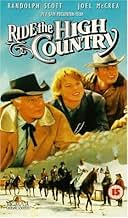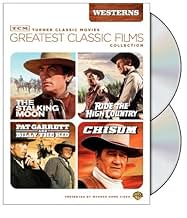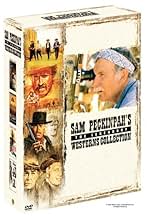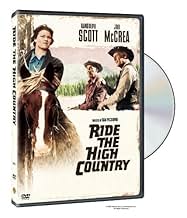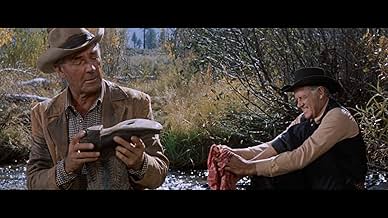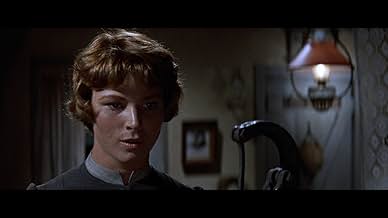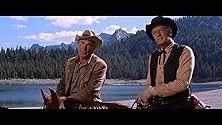AVALIAÇÃO DA IMDb
7,4/10
16 mil
SUA AVALIAÇÃO
Um ex-soldado da União é contratado para transportar ouro de uma comunidade mineira através de um território perigoso. Mas o que ele não percebe é que seu parceiro e velho amigo está conspir... Ler tudoUm ex-soldado da União é contratado para transportar ouro de uma comunidade mineira através de um território perigoso. Mas o que ele não percebe é que seu parceiro e velho amigo está conspirando para traí-lo.Um ex-soldado da União é contratado para transportar ouro de uma comunidade mineira através de um território perigoso. Mas o que ele não percebe é que seu parceiro e velho amigo está conspirando para traí-lo.
- Direção
- Roteiristas
- Artistas
- Indicado para 1 prêmio BAFTA
- 2 vitórias e 2 indicações no total
Alice Allyn
- Candy
- (não creditado)
George Bell
- Townsman
- (não creditado)
Oscar Blank
- Miner
- (não creditado)
Chet Brandenburg
- Miner
- (não creditado)
Don Brodie
- Spieler
- (não creditado)
Chris Carter
- Rose
- (não creditado)
- Direção
- Roteiristas
- Elenco e equipe completos
- Produção, bilheteria e muito mais no IMDbPro
Avaliações em destaque
Randolph Scott and Joel McCrea will probably be remembered as the top "B" western stars in movies. But their last film "Ride the High Country" stands as an "A" western and a very good one too.
Perhaps they owe this final chance to director Sam Peckinpah who turns the story into a splendid film in its genre shot in beautiful outdoor sceneries, with very well managed action scenes, a credible script, great settings and a fine musical score too.
Two moments are particularly outstanding in my opinion: the sort of "Fellinesc" sequence at the wedding with all those bizarre characters and the final showdown where Scott and McCrea face the mean Hammond brothers (John Anderson, James Drury and Warren Oates) in the "old fashioned way".
A well deserved "A" product for both actors -that amused and thrilled us western fans- through their long careers in the genre.
Perhaps they owe this final chance to director Sam Peckinpah who turns the story into a splendid film in its genre shot in beautiful outdoor sceneries, with very well managed action scenes, a credible script, great settings and a fine musical score too.
Two moments are particularly outstanding in my opinion: the sort of "Fellinesc" sequence at the wedding with all those bizarre characters and the final showdown where Scott and McCrea face the mean Hammond brothers (John Anderson, James Drury and Warren Oates) in the "old fashioned way".
A well deserved "A" product for both actors -that amused and thrilled us western fans- through their long careers in the genre.
It was goodbye to two stars from the golden age of Westerns and hello to a director who would help transform the genre into something bloodier, nastier, and truer. A skillful compromise of those visions, "Ride The High Country" presents a kind of crossroads that feels more like a destination, a perfect summing-up of the legend and the reality of the American West.
Steve Judd (Joel McCrea) is a weary old lawman trying to make ends meet as he nears the end of the road. To transport some gold from a mining town to a bank, he takes on the services of an old buddy, Gil Westrum (Randolph Scott). Westrum's as sleek and angling as Judd is square, and has more on his mind than collecting $10 a day risking his neck guarding someone else's money. While this remains unsettled, the pair gets mixed up with a woman (Mariette Hartley) who thinks she's in love with a miner whose idea of a honeymoon means sharing the wealth with his hideous brothers.
Ask anyone with a glancing knowledge of films what kind of movies Sam Peckinpah made, and they will likely describe a movie very different from this. There's some shooting, a little blood, and an unshaven Warren Oates, but otherwise "Ride The High Country" is a movie in the classic Western mold. There are some dissonances for Scott and McCrea's old-time fans to sort through, like Scott's ambiguous morality, but this is all-in-all the nicest movie Peckinpah ever made, decent characters set against an inspiring landscape, the kind of yarn John Ford or Anthony Mann would have delivered.
Not that everything is too black-and-white. The girl, having escaped her stern father and the stump farm where they lived, asks Judd at one point about right and wrong: "It isn't that simple, is it?" "No, it isn't," Judd replies. "It should be, but it isn't."
McCrea is the center of this film, a pillar of virtue. He quotes the Bible, but it's not clear he's especially religious or just stoic in the classic tradition. When he talks about his simple desire "to enter my house justified," he may have the Christian meaning in mind, or just the humanistic ideal of having been a good man when all is said and done. Nevertheless, there are intimations of a deeper truth in the redemption of Westrum and his unambiguous last line: "I'll see you later."
Peckinpah does present a bull-headed Christian zealot in R.G. Armstrong as the girl's father, but he's essentially decent, afraid of life, what it did to him and can do to her. Some see a suggestion of incest in their relationship, when she tells him he doesn't want her with any man but him, but it's more likely that's her complaining about his being overprotective.
There's a lot of humor here, too, much of it courtesy of Randolph Scott. Scott could be a stiff in other films; here he settles nicely into the role of a cut-up, like when he watches his young charge Heck get the tar beaten out of him twice without lifting a finger to help him. "Good fight, I enjoyed it," Westrum chirps as the boy licks his wounds.
The film culminates in a good fight with the Hammonds, so ornery they jeer at Heck when he brings the girl to their doorstep and she assures them he was a gentleman: "How come? Something wrong with him?" It's the one gunfight in the film, and though its one more than some Peckinpah films like "Junior Bonner" had, it's another reason for the film sticking out as unusual in the director's oeuvre.
But it's a good kind of difference, for the most part, as Peckinpah finds his métier while paying tribute to those who came before him with the help of McCrea and Scott. Like its heroes, "Ride The High Country" moves a little slowly in parts, but watching it, you'll likely agree with me the long journey is worth the ride.
Steve Judd (Joel McCrea) is a weary old lawman trying to make ends meet as he nears the end of the road. To transport some gold from a mining town to a bank, he takes on the services of an old buddy, Gil Westrum (Randolph Scott). Westrum's as sleek and angling as Judd is square, and has more on his mind than collecting $10 a day risking his neck guarding someone else's money. While this remains unsettled, the pair gets mixed up with a woman (Mariette Hartley) who thinks she's in love with a miner whose idea of a honeymoon means sharing the wealth with his hideous brothers.
Ask anyone with a glancing knowledge of films what kind of movies Sam Peckinpah made, and they will likely describe a movie very different from this. There's some shooting, a little blood, and an unshaven Warren Oates, but otherwise "Ride The High Country" is a movie in the classic Western mold. There are some dissonances for Scott and McCrea's old-time fans to sort through, like Scott's ambiguous morality, but this is all-in-all the nicest movie Peckinpah ever made, decent characters set against an inspiring landscape, the kind of yarn John Ford or Anthony Mann would have delivered.
Not that everything is too black-and-white. The girl, having escaped her stern father and the stump farm where they lived, asks Judd at one point about right and wrong: "It isn't that simple, is it?" "No, it isn't," Judd replies. "It should be, but it isn't."
McCrea is the center of this film, a pillar of virtue. He quotes the Bible, but it's not clear he's especially religious or just stoic in the classic tradition. When he talks about his simple desire "to enter my house justified," he may have the Christian meaning in mind, or just the humanistic ideal of having been a good man when all is said and done. Nevertheless, there are intimations of a deeper truth in the redemption of Westrum and his unambiguous last line: "I'll see you later."
Peckinpah does present a bull-headed Christian zealot in R.G. Armstrong as the girl's father, but he's essentially decent, afraid of life, what it did to him and can do to her. Some see a suggestion of incest in their relationship, when she tells him he doesn't want her with any man but him, but it's more likely that's her complaining about his being overprotective.
There's a lot of humor here, too, much of it courtesy of Randolph Scott. Scott could be a stiff in other films; here he settles nicely into the role of a cut-up, like when he watches his young charge Heck get the tar beaten out of him twice without lifting a finger to help him. "Good fight, I enjoyed it," Westrum chirps as the boy licks his wounds.
The film culminates in a good fight with the Hammonds, so ornery they jeer at Heck when he brings the girl to their doorstep and she assures them he was a gentleman: "How come? Something wrong with him?" It's the one gunfight in the film, and though its one more than some Peckinpah films like "Junior Bonner" had, it's another reason for the film sticking out as unusual in the director's oeuvre.
But it's a good kind of difference, for the most part, as Peckinpah finds his métier while paying tribute to those who came before him with the help of McCrea and Scott. Like its heroes, "Ride The High Country" moves a little slowly in parts, but watching it, you'll likely agree with me the long journey is worth the ride.
Aging ex-lawman Joel McCrea is hired to protect gold shipment and asks old friend Randolph Scott to join him. Scott brings a young sidekick (Ron Starr) with him and has intentions of robbing the gold shipment, with or without McCrea's help. Last hurrah for western stars Randolph Scott and Joel McCrea. Scott's last film completely and McCrea's last worth mentioning. It's funny but I never really think of Joel McCrea as a western star. I know he did a lot of them, particularly in the later half of his career, but I always preferred his comedy and drama roles from earlier on. The westerns he did were not that impressive to me. Scott, on the other hand, was a bona fide western legend on the basis of his Boetticher films alone. Mariette Hartley is good in her film debut. Ron Starr is the film's weak link. It's not surprising he would have a limited acting career. It's been said by many to be Sam Peckinpah's best film. Is it? I'm not quite there but I do believe it's one of his least self-indulgent films. He's not one of my favorite directors but he did do some good work. This is right up there. It's not a perfect film. The first half is kind of pedestrian for a film with such a high reputation. But the second half delivers and you can see why many call this a classic.
After a time working as director and writer of Western TV Series, Sam Peckinpah started his career on film with "The Deadly Companions",a romantic Western that seemed like an extension of his work on TV; however, his next film, "Ride the High Country", was an completely different beast, it was a deep meditation on the long-lived Western genre that introduced themes that would become Peckinpah's obsessions and signature: the end of an era and the quest for redemption and meaning in life. This raw masterpiece faced a cold reception when it premiered, but gained a tremendous success overseas (winning the Belgium Film Festival), demonstrating to the world that this newcomer was here to stay.
Former lawman Steve Judd (Joel McCrea) is now an aging man, and is hired to transport gold from a mining community through a dangerous territory. As he has the need to hire assistants, he finds his old friend and former partner Gil Westrum (Randolph Scott) and hires him and Westrum's young protegé, Heck Longtree (Ron Starr) to assist him. However, Steve doesn't know that his two assistants are planning to steal the gold, with or without Steve's help. Things will get complicated when the trio is forced to help a young woman named Elsa (Mariette Hartley) to escape from her fianceé and his criminal brothers.
Written by another veteran of Western TV series, N.B. Stone Jr. (who without a doubt worked with Peckinpah in "The Rifleman"), "Ride The High Country" is a clear step forward in the evolution of the Western as a film genre. As one of the first "revisionist" westerns, it shows a meditation on the genre and how two aging men become outdated by their world and suddenly obsolete. Through powerful lines of dialog and a slowly and carefully constructed plot, the film shows Peckinpah's favorite themes like honor, loyalty, redemption and the destruction of the West (both the historical one and the Western genre) for the first time in one of the most moving Westerns ever. As many have pointed out, one doesn't need to like Westerns to appreciate this film, as it's basic theme of humanity facing change is an immortal one.
Peckinpah's love for the genre is quite obvious and lead to an awesome use of the genre's elements. Starting with a great camera-work that stands as a heir of John Ford's, exchanging Ford's Monument Valley for the beauty nature of Inyo National Forest in California. Forecasting the Spaghetti Western revolution, Peckinpah's realistic Western makes its first appearance, and even when it's considerably less raw than the violent world of "The Wild Bunch", it's a step ahead of the classic Western. In many ways this was not only the beginning of Peckinpah's career, but also of the revisionism in Westerns and the evolution that would change the genre forever.
The inspired casting of Randolph Scott and Joel McCrea in the lead roles is simply brilliant, as no one else but this former legends of classic Western films could embody the meaning of their characters, two old men that easily could had been the future of the many lawmen these two actor played in their lives. It was Scott's last film before retiring, and really it couldn't been a better closure for a career. Newcomers Mariette Hartley and Ron Starr represent the new West, too naive and ignorant of the past that precedes them; and both actor's performances are top-notch, although Starr is definitely the weakest link in the cast.
It's hard to believe that this movie almost was a failure in the U.S., but fortunately now it is receiving the attention it rightfully deserves. The natural landscape and the contrast of the new and the old make a great visual composition, almost as the missing link between the classic golden age of Ford and Wayne, and its modern counterparts. The film has few minor flaws, such as the average performance of some members of the cast, but nothing really annoying. Modern viewers may feel it moves too slow, but that slow pace actually enhances the feeling of that slow but steady change that suddenly caught the characters.
"Ride the High Country" is not a very famous film, but it really deserves a wider audience, not only because it introduced us to Peckinpah's film-making, but also because of its deep meditation on the Western genre and its wonderful immortal theme of mankind facing change. All in all, this film is a very recommended one, and I dare to say it's Peckinpah's first raw masterpiece. 9/10
Former lawman Steve Judd (Joel McCrea) is now an aging man, and is hired to transport gold from a mining community through a dangerous territory. As he has the need to hire assistants, he finds his old friend and former partner Gil Westrum (Randolph Scott) and hires him and Westrum's young protegé, Heck Longtree (Ron Starr) to assist him. However, Steve doesn't know that his two assistants are planning to steal the gold, with or without Steve's help. Things will get complicated when the trio is forced to help a young woman named Elsa (Mariette Hartley) to escape from her fianceé and his criminal brothers.
Written by another veteran of Western TV series, N.B. Stone Jr. (who without a doubt worked with Peckinpah in "The Rifleman"), "Ride The High Country" is a clear step forward in the evolution of the Western as a film genre. As one of the first "revisionist" westerns, it shows a meditation on the genre and how two aging men become outdated by their world and suddenly obsolete. Through powerful lines of dialog and a slowly and carefully constructed plot, the film shows Peckinpah's favorite themes like honor, loyalty, redemption and the destruction of the West (both the historical one and the Western genre) for the first time in one of the most moving Westerns ever. As many have pointed out, one doesn't need to like Westerns to appreciate this film, as it's basic theme of humanity facing change is an immortal one.
Peckinpah's love for the genre is quite obvious and lead to an awesome use of the genre's elements. Starting with a great camera-work that stands as a heir of John Ford's, exchanging Ford's Monument Valley for the beauty nature of Inyo National Forest in California. Forecasting the Spaghetti Western revolution, Peckinpah's realistic Western makes its first appearance, and even when it's considerably less raw than the violent world of "The Wild Bunch", it's a step ahead of the classic Western. In many ways this was not only the beginning of Peckinpah's career, but also of the revisionism in Westerns and the evolution that would change the genre forever.
The inspired casting of Randolph Scott and Joel McCrea in the lead roles is simply brilliant, as no one else but this former legends of classic Western films could embody the meaning of their characters, two old men that easily could had been the future of the many lawmen these two actor played in their lives. It was Scott's last film before retiring, and really it couldn't been a better closure for a career. Newcomers Mariette Hartley and Ron Starr represent the new West, too naive and ignorant of the past that precedes them; and both actor's performances are top-notch, although Starr is definitely the weakest link in the cast.
It's hard to believe that this movie almost was a failure in the U.S., but fortunately now it is receiving the attention it rightfully deserves. The natural landscape and the contrast of the new and the old make a great visual composition, almost as the missing link between the classic golden age of Ford and Wayne, and its modern counterparts. The film has few minor flaws, such as the average performance of some members of the cast, but nothing really annoying. Modern viewers may feel it moves too slow, but that slow pace actually enhances the feeling of that slow but steady change that suddenly caught the characters.
"Ride the High Country" is not a very famous film, but it really deserves a wider audience, not only because it introduced us to Peckinpah's film-making, but also because of its deep meditation on the Western genre and its wonderful immortal theme of mankind facing change. All in all, this film is a very recommended one, and I dare to say it's Peckinpah's first raw masterpiece. 9/10
"All I want is to Enter My House Justified"
Sam Peckinpah's second feature film is today standing up as a must see and must own for those interested in the Western genre.
The film sees ageing lawman Steve Judd land a job of escorting a gold shipment safely to a bank in Hornitos. After running into old friend, and fellow aged lawman Gil Westrun, he hires both he and his young sparky sidekick Heck Longtree to hopefully see the job through to a successful conclusion. Yet Gil has other ideas, for where Steve is upstanding and adhering to the values he has lived his life by, Gil sees this as one last chance to actually get a big payday. The journey takes a further twist as the three men meet and then save Elsa Knudsen from a brutal marriage, it's an incident that puts them all on a collision course with the Hammond brothers.
What we have here is Sam Peckinpah's first film dealing with men who have outlived their time. We witness some emotionally poignant stuff as the two main protagonists know that they have aged beyond their world, yet as alike as they are, they have different ideals in how to deal with the advent of time. The masterstroke here is the casting of genre legends Joel McRea & Randolph Scott as Steve & Gil respectively. It's evident from the off that both men are identifying with their characters, with both men hitting top emotional form to fully realise the thematic heart of the story. Mariette Hartley makes her film debut as Elsa, and she fits in nicely with the quality on show behind and in front of the camera. Lucien Ballard's cinematography is gorgeous as the various California locations envelope the protagonists in a sort of elegiac way, and Peckinpah directs with his heart as well as his head.
Bookended by two heart-achingly super sequences, of which the finale has rightly passed into Western genre legend, this really is a strong and beautiful film, one that simultaneously shows a truly great director was at work. For here he was left alone, and the final result is a quality Western beating far more than just a cowboy heart. The supporting cast is strong, notably Edgar Buchanan, L.Q. Jones & John Anderson, while the undervalued George Bassman provides a narratively fitting tonal music score. If there is a criticism? it's that Peckinpah doesn't let the younger characters breath, but given the film's core focus on aged men in an aged passing era, well it's easily forgiven. A precursor to The Wild Bunch for sure, but while the theme is the same for both films, this one impacts in a very different way. Highly recommended, not just for the Oater crowd, but for fans of classic cinema too. 9/10
Sam Peckinpah's second feature film is today standing up as a must see and must own for those interested in the Western genre.
The film sees ageing lawman Steve Judd land a job of escorting a gold shipment safely to a bank in Hornitos. After running into old friend, and fellow aged lawman Gil Westrun, he hires both he and his young sparky sidekick Heck Longtree to hopefully see the job through to a successful conclusion. Yet Gil has other ideas, for where Steve is upstanding and adhering to the values he has lived his life by, Gil sees this as one last chance to actually get a big payday. The journey takes a further twist as the three men meet and then save Elsa Knudsen from a brutal marriage, it's an incident that puts them all on a collision course with the Hammond brothers.
What we have here is Sam Peckinpah's first film dealing with men who have outlived their time. We witness some emotionally poignant stuff as the two main protagonists know that they have aged beyond their world, yet as alike as they are, they have different ideals in how to deal with the advent of time. The masterstroke here is the casting of genre legends Joel McRea & Randolph Scott as Steve & Gil respectively. It's evident from the off that both men are identifying with their characters, with both men hitting top emotional form to fully realise the thematic heart of the story. Mariette Hartley makes her film debut as Elsa, and she fits in nicely with the quality on show behind and in front of the camera. Lucien Ballard's cinematography is gorgeous as the various California locations envelope the protagonists in a sort of elegiac way, and Peckinpah directs with his heart as well as his head.
Bookended by two heart-achingly super sequences, of which the finale has rightly passed into Western genre legend, this really is a strong and beautiful film, one that simultaneously shows a truly great director was at work. For here he was left alone, and the final result is a quality Western beating far more than just a cowboy heart. The supporting cast is strong, notably Edgar Buchanan, L.Q. Jones & John Anderson, while the undervalued George Bassman provides a narratively fitting tonal music score. If there is a criticism? it's that Peckinpah doesn't let the younger characters breath, but given the film's core focus on aged men in an aged passing era, well it's easily forgiven. A precursor to The Wild Bunch for sure, but while the theme is the same for both films, this one impacts in a very different way. Highly recommended, not just for the Oater crowd, but for fans of classic cinema too. 9/10
Você sabia?
- CuriosidadesFinal film of Randolph Scott. He retired from acting once he saw the finished film, saying he wanted to quit while he was ahead and that he would never be able to better his work here.
- Erros de gravaçãoThe many 34-star flags, all on flagpoles, at the opening of the movie do not match the Bobby helmets, open automobiles and electric wiring over the streets. The 34-star U.S. flag was in use only from 1861-1863. There is, however, also an inconsistent 45-star flag strung across the street. That design, in use from 1896-1908, does match the movie's time setting.
- Citações
Steve Judd: All I want is to enter my house justified.
- Cenas durante ou pós-créditosIntroducing Mariette Hartley
- ConexõesFeatured in America at the Movies (1976)
Principais escolhas
Faça login para avaliar e ver a lista de recomendações personalizadas
Detalhes
- Data de lançamento
- País de origem
- Idiomas
- Também conhecido como
- Pistoleiros do Entardecer
- Locações de filme
- Mammoth Lakes, Califórnia, EUA(Twin Lake, Horseshoe Lake)
- Empresa de produção
- Consulte mais créditos da empresa na IMDbPro
Bilheteria
- Orçamento
- US$ 813.000 (estimativa)
- Tempo de duração1 hora 34 minutos
- Cor
- Proporção
- 2.35 : 1
Contribua para esta página
Sugerir uma alteração ou adicionar conteúdo ausente

Principal brecha
What is the Hindi language plot outline for Pistoleiro do Entardecer (1962)?
Responda

